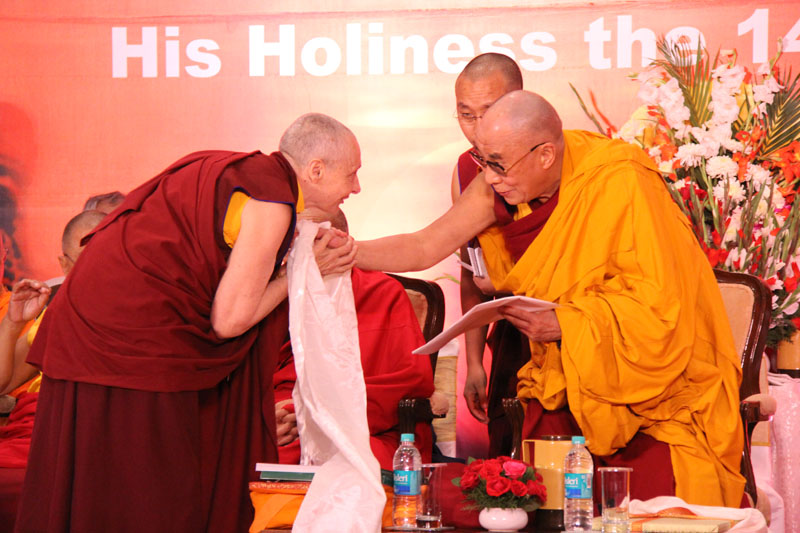WESTERN BUDDHIST TEACHERS’ CONFERENCE
IN CONVERSATION WITH HH the DALAI LAMA
16-19 March 1993 – Dharamsala
Monasticism
Jetsunma: First of all I would like to make it clear that of course monasticism is not for everybody. Nor should it be for everybody, but there should exist the institution of monasticism for that small group of individuals who are drawn to the ideal of a total dedication to the Dharma through renunciation and purity. Here we are concentrating on the western monks and nuns ordained in the Tibetan tradition.
As we all know, modern society is based mainly on greed and believes that happiness depends on acquisition and the satisfaction of our desires. As a result, sensuality and violence rage everywhere nowadays. On the other hand, the monastic sangha is a group of people whose lives are based on purity, renunciation, restraint, and discipline, on reducing wants and desires and cultivating contentment. This goes completely against the stream of the world. Though even Dharma centers are not immune to the idea that more is beautiful.
Traditionally, in the East, the monastic sangha had the role of preserving and transmitting the Dharma so that lay people supported and respected the sangha. They loved and felt proud of their monks and nuns. However, in the West, there is not the same situation. This is partly because in modern times the scholars and the meditation teachers who transmit the Dharma are mainly lay people. However, this does not mean that the monastic sangha is useless for the modern world.
Because the monastic sangha preserve a way of life based on the Dharma principles of renunciation and contentment, they are a living example that restraint and simplicity can bring happiness and peace. They remind us that one can live with no intimate relationships, no family, few possessions, no security, and yet be perfectly happy and content.
Of course the monks and nuns should have the time to study and practice without the material problems of earning a living or the emotional entanglements in close personal relationships. The sangha has a freedom, which usually not available to those who have to live a lay life—both a physical freedom and an emotional freedom.
However, due to modern attitudes which stem from our Protestant and materialistic backgrounds, even sincere Western Buddhists may consider that the lay life with its involvement in the role of the family, close relationships, successful careers, (all these mostly based on our desires and attachments) are nowadays a superior way of practicing the Dharma. Therefore, the monastic sangha (especially western monks and nuns) are seen as selfish escapists, as neurotics or parasites – people unable to face up to the challenge of intimate relationships, and so on. We all know about this. Renunciation is disparaged and misunderstood. Celibacy and a life of purity is considered somehow slightly perverse. ‘Monastics cannot make it in the world so therefore they renounce it—because the world has renounced them.’
But a true monastic lives without any security, dependent on the unsolicited generosity of others. This is not being a parasite. This is going forth in faith. Also Jesus admonished, ‘Give no thought unto the morrow what you shall eat and what you shall wear.’ That in a way is what being a member of the sangha is about, that we are not overmuch concerned with our physical existence, that we have faith that the Dharma will provide enough for our needs if on our part we are practising in all sincerity. There is that faith that we will never going to starve, that we will be supported—not always materially, but in some way.
However, in Dharma circles in the West, the nuns live in a kind of limbo. They are neither supported by the laity, nor in fact by the lamas themselves. Even when some support is forthcoming from centers where they work, nonetheless they are still in many ways second class citizens. They are given not good places to stay and treated as inferior to paying guests who have more money and can support the centers. The sangha is usually shoved in the background. They are given very little personal attention. In fact there is little respect or appreciation for having devoted their whole lives to the Dharma.
Centers are mainly geared toward lay people and the western monastic are either ignored and considered unimportant, or else they are overworked with running the centers often with little training or experience. So therefore, the stress of maintaining high standards is difficult. Nonetheless people expect impeccable -even with little training. These nuns are only imperfect human beings and also need some sympathy and appreciation, but this they rarely get.
Also, as monastics, they lose out on the pleasures of the family life, the worldly life, yet at the same time they have very few of the joys of a true monastic life. Here we are speaking of those westerners ordained in the Tibetan tradition, because usually they are not living in a community, but stay by themselves. They cannot do the things which the lay people can do, but neither are they living a communal monastic life. So they are in a kind of monastic bardo. It’s a sangha bardo.
Some of these nuns feel very lonely also. They feel unable to integrate the idea of non-attachment and friendships – with seeing other people as lovable and developing affection, – because then they consider that is becoming too involved again and not suitable for a monastic person. They don’t know how to get the balance and therefore their practice becomes quite sterile and they feel alienated from the people around them. Also they often feel that the robe itself alienates them from other people; that other people will act towards them artificially and that they cannot have any close relationships. Who can they open up to? As they are usually not living in a monastic community where they could have friendships, they are very lonely. It is a hard life for many of these nuns living in lay Dharma centers.
In the West some may feel very uncomfortable wearing robes in the street. People might stare or say, ‘Oh, Hare Krishna!’ They feel very conspicuous and on show. They might feel that the wearing of the robe does create a separation from ordinary people so that they cannot even help people as effectively.
Then, they get very little support from the lamas. Your Holiness, this is true. For one thing, Western lay supporters are not even encouraged to esteem their own native sangha, unlike in traditional Asian societies where the lay people naturally respect and support their sangha. The lamas never mention this as part of their followers’ Dharma practice. So the lay people tend to overlook the western monastics and there is little sympathy or appreciation for what they are trying to do.
For example, although the lamas take care of their own Tibetan sangha: they build monasteries, they train the monks, they assume responsibility when they ordain them by placing them into the monasteries, so there is this support system. For the Western sangha, this is non-existent. The lamas ordain and then the new nun is thrown out into the world with no training, no backup system, no encouragement, no support, no guidance—nothing. ‘Get on with it.’
This is very hard. I am surprised that so many of the Western monastic sangha stay for so long. I’m not surprised that they disrobe. They start with so much enthusiasm, so much pure faith and devotion. Gradually it just goes down and down as they get so discouraged, so disillusioned, and there is no one who helps them. This is really true, Your Holiness. It is a very hard situation which has never happened in the history of Buddhism before. However, to end on a higher note, I make a prayer that this life of purity and renunciation which is so rare and precious in this world, that this Sangha Jewel may not simply be thrown down into the mud of our indifference and contempt, but may be cherished and polished to reveal its inherent brilliance, shedding the light of Dharma throughout the world.
[Following this talk His Holiness put his head in his hands and wept.]

